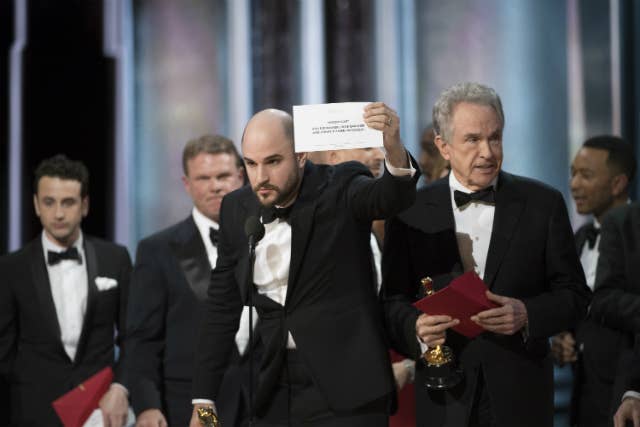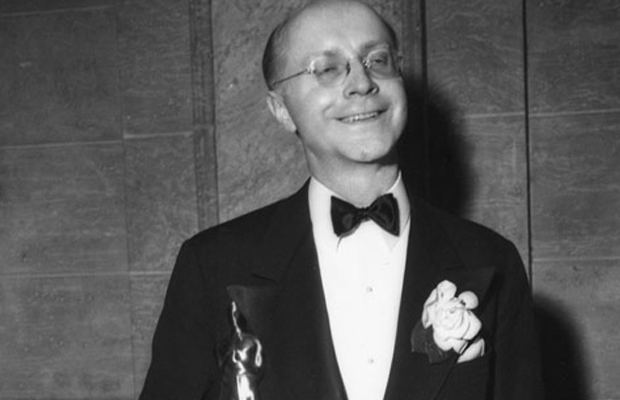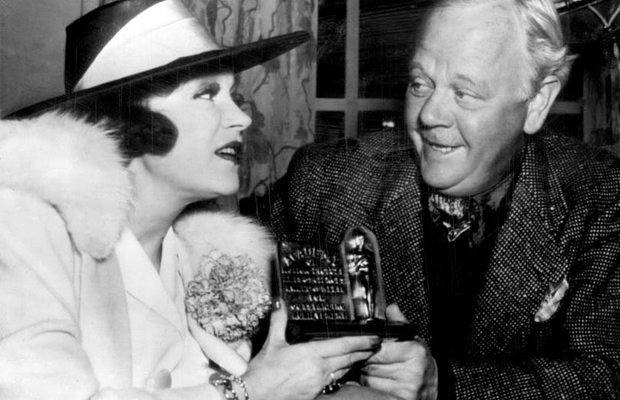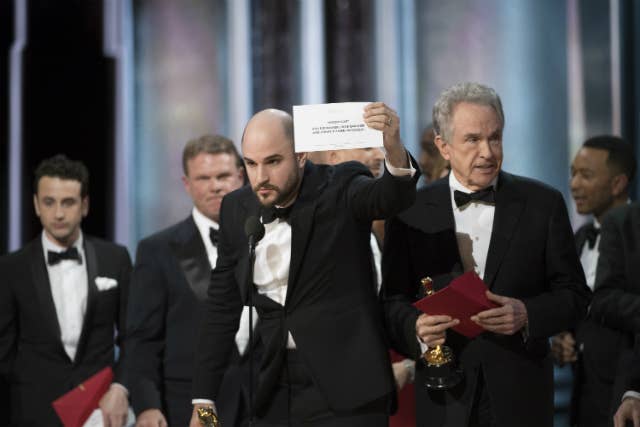
Most Oscar speeches are well-prepared, clean soundbites. Tell them you're honored to be chosen from a field of deserving nominees, name check the producer, your co-star, and get the hell out of there. Over the years at the Academy Awards, this method has proven the wisest course of action.
When actors no longer have writers to fill their mouths with words and they go off script during acceptance speeches, things get strange. The Oscar podium has been home to outlandish scenes over the years: political grandstanding, ballooning egos, and even one-armed push-ups.
Though it's hard to upstage last year's Best Picture catastrophe, in the midst of the #MeToo movement, a polarizing President against an incredibly left-leaning Hollywood, and (despite strides such as Get Out's multiple recognitions) a still generally #OscarsSoWhite, there's bound to be something worth tuning in for.
While we desperately hope for an on-stage meltdown that we can view as GIFs come Monday morning, we'd like to thank the Academy for the 25 Weirdest Oscar Speeches of All Time.
Warren Beatty, Faye Dunaway, Fred Berger, and Jordan Horowitz, Best Picture, "Moonlight" (2017)
View this video on YouTube
So maybe "weird" isn't the exact right word— excruciating? Unreal? Fucking batshit? The individual play by play of this unraveling doesn't get old, from Faye Dunaway prematurely blurting out La La Land, to word slowly making its way around the cast and crew on stage, to the total range of reactions to the realization that Moonlight was the actual winner. It was a shake-up for the Hollywood old heads, a savior of dull Oscar parties across the country, and a moment we're not likely to see ever again.
Matthew McConaughey, Best Actor, "Dallas Buyers Club" (2013)
View this video on YouTube
McConaughey's speech has already achieved legendary status less than a year after it was delivered. The highlight of his time behind the podium was his explanation that his hero is "me in 10 years" and the ensuing convoluted minutes-long explanation. This wasn't the only wonderfully ridiculous moment in the speech though. He managed to work in the statement, "It's a scientific fact that gratitude reciprocates," refer to his son as "Mr. Stone," and end with his signature "Alright, alright, alright" on his way to Oscar speech immortality.
Per Hallberg and Karen Baker Landers, Skyfall and Paul N. J. Ottosson, Zero Dark Thirty, Best So
View this video on YouTube
Technical awards don't often lead to the weirdest Oscar moments, except when they end in a tie. An Oscar contest has tied on six occasions in the award's history. 1932's Best Actor, 1949's Documentary Short Subject, 1968's Best Actress, 1986's Documentary Feature, 1994's Live-action Short, and 2012's Best Sound Editing are the only instances of split votes.
Stranger still, both male winners had gorgeous flowing blonde hair. Actually, if you know sound guys, you know that's not actually that weird.
Roger Ross Williams, Best Documentary (Short Subject), "Music By Prudence" (2009)
View this video on YouTube
Rarely does the Oscar speech for Best Documentary (Short Subject) get much attention. When Elinor Burkett took the stage to add her two cents during Roger Ross Williams' acceptance speech for Music By Prudence, she was dubbed a "Lady Kanye" for interrupting him.
Further investigation proved the situation was far more complicated than that. Burkett had been removed from the project, but retained credit as a producer. She felt strong-armed out of Oscar press by Williams, and felt that she should be a part of the win. For Williams' part, he maintained, "I own the film. She has no claim whatsoever. She has nothing to do with the movie." Shots.
Adrien Brody, Best Actor, "The Piano", (2002)
View this video on YouTube
The speech was fine, but the lip-lock with Halle Barry was lame. The moment was received as "hot" and "cute" by media outlets at the time, but Brady gets no pass here.
We'd encourage those of you wowed by Adrien's move to imagine how you'd feel if random people just dipped and kissed you whenever they got excited. If you pull a stunt like that next time you win Employee of the Month, you're liable to get shot. Or assaulted in the parking lot. Or fired. Or all the three at the same time.
Michael Moore, Best Documentary, "Bowling For Columbine" (2002)
View this video on YouTube
Michael Moore railing against President Bush isn't out of character. What was weird about this speech wasn't Moore's words, but the audience's reaction. It was striking to hear the documentarian booed for saying little more than what many in Hollywood fervently believe.
The political history of the Academy Awards is polarized: some have viewed the award as a platform while others have clung strongly to the separation of entertainment and politics. We're left to wonder if the documentary award is valued by the Academy only as long as viewers aren't asked to dwell on what the winning documentaries are actually about.
Angelina Jolie, Best Supporting Actress, Girl Interrupted, (1999)
View this video on YouTube
Angelina Jolie is known to be a little unstable. The world got a first-hand glimpse into her weirdness during this speech, when she decided to tell us all just how much she loved her brother. It made the world pretty uncomfortable.
Jolie immediately became tabloid fodder and never looked back. From her to fixation on blood to the rumor that she once tried to hire a hit man for herself, Jolie's special brand of crazy has been in the public eye ever since.
Roberto Benigni, Best Foreign Language Film, "Life is Beautiful" (1998)
View this video on YouTube
When the least uncomfortable part of your speech is climbing over chairs to get to the stage, you likely should've hired a speech writer. The strangest moment in Benigni's legendarily unorthodox acceptance had to be when he told Sophia Loren that he wants to be "rocked by the waves" of her beauty.
Despite the palpable discomfort in the air, the whole speech was redeemed when he said, "I would like to thank my parents...they gave me the biggest gift: poverty." Word.
James Cameron, Best Director, "Titanic" (1997)
View this video on YouTube
Note to future blockbuster directors: refrain from quoting your own movie in your speech. If you do quote your film, don't let out a series of savage yelps afterwards.
Rumor has it that if Avatar had won Best Picture, Cameron would have shouted "Sky People cannot learn, you do not see!" in Na'vi.
Cuba Gooding Jr., Best Supporting Actor, "Jerry Maguire" (1996)
View this video on YouTube
Sheer ecstasy mixed with overwhelmed humility is usually a good look, but Gooding laid it on a little thick. Though his exuberance came off well at the start, by the end of his speech, he was shouting over the "get the hell off the stage" music and jumping up and down on like a mad man.
Gooding went on to be nominated for five Razzie Awards for shit like this.
Emma Thompson, Best Adapted Screenplay, "Sense and Sensibility" (1995)
View this video on YouTube
She didn't quite top her Golden Globe acceptance speech for the same script, where she read a letter "written by Jane Austen" recounting her Globes experience while picking up the less-coveted statue. Thompson tried her damnedest to outdo herself for the Academy, though. She regaled the crowd with a story of how she went to Jane Austen's grave "to pay her respects and tell her about the grosses" prior to the ceremony. The grosses?
Jack Palance, Best Supporting Actor, "City Slickers" (1991)
View this video on YouTube
Upon winning his statue, Palance marched on stage and greeted host and City Slickers co-star Billy Crystal with "Billy Crystal... I crap bigger than him." Things only got more amazing from there as Palance solidified his place as America's macho, kind-of-out-of-it grandfather. After talking rather frankly about ageism in Hollywood, he dropped and gave us 20, performing a set of one-armed push-ups before finishing his acceptance speech.
Cher, Best Actress, "Moonstruck" (1987)
View this video on YouTube
Vanity is an attribute we already readily associate with actors and actresses. Cher mercilessly affirmed this stereotype in her 1987 speech by thanking her make-up man, hairdresser, her assistant, and "the lady who helped me speak in a Brooklyn accent," without explicitly thanking any other crew members.
Don't worry though, she did say that all of you unnamed co-workers were "really fabulous."
Sally Field, Best Actress, "Places in the Heart" (1984)
View this video on YouTube
More appropriate for the therapist's couch than the Oscar podium, Sally Fields' unsettling 1985 speech spawned numerous parodies and earned her a dubious place in Academy history.
Despite the fame of her words, hers is likely the most frequently misquoted Oscar speech. She's often remembered as having said, "You like me, you REALLY like me!" there really is no "really." Field directly quoted an earlier role, stating only, "You like me! You like me!"
Shirley MacLaine, Best Actress, "Terms of Endearment" (1983)
View this video on YouTube
There was a distinct Dr. Jekyll and Mr. Hyde vibe to MacLaine's speech following her win for Terms of Endearment. She began with a potent combination of her notorious brand of spiritualism/humility. After she finished showering praise on her co-stars and director, she told the world how she really felt, closing with, "I deserve this. Thank you."
MacLaine crowns herself.
Vanessa Redgrave, Best Supporting Actress, "Julia" (1977)
View this video on YouTube
At the 1977 Academy Awards, Vanessa Redgrave found herself between a political rock and a hard place. Redgrave was nominated for her performance as a woman who was heavily involved in early resistance to the Nazis. The same year, the actress had funded and narrated a documentary, The Palestinian, a favorable look at the PLO. This created a politically charged media circus. Members of the Jewish Defense League burned her image in effigy in front of the ceremony. Redgrave didn't shy away from her views when she won the statue. She made one of the most apologetically and overtly political acceptance speeches in Oscar history.
Marlon Brando, Best Actor, "The Godfather" (1972)
View this video on YouTube
Though Brando's career was fraught with mic-dropping moments, this has to rank near the top. Rather than personally accept his award for The Godfather on his own, Brando sent the beautiful Sacheen Littlefeather, President of the National Native American Affirmative Image Committee, in his place.
He did so in protest of the representation of Native Americans in Hollywood, and the government response to the 1973 occupation of Wounded Knee . Though she was clearly quite timid in the face of the opportunity, Littlefeather's (aka Marie Louise Cruz) words still resonate today.
Jane Fonda, Best Actress, "Klute" (1971)
View this video on YouTube
Though Alfred Hitchcock holds the record for pithiest Oscar speech, Fonda gave him a run for his money with her strange 1971 acceptance: "There's a great deal to say, and I'm not going to say it tonight. I would just like to thank you very much."
Like some cryptic soothsayer, she stared at the audience for a moment, uttered these words, and hurried away. And that's how the Curse of the Jane Fonda first started.
Charlie Chaplin, Honorary Oscar (1971)
View this video on YouTube
Weird doesn't quite describe it. Chaplin's acceptance of an Oscar for Lifetime Achievement is surreal. For those who have seen the man's work, hearing his voice is a strange experience. Though he little resembled himself as a silent screen star by that point in his life, the glint in his eye let us know that this was the same Chaplain we remember. The depth of humanity and gratitude he mustered was overwhelming. Though there have been more outlandish speeches, none left us with as with as uncanny a feeling than watching the great silent star speak.
George C. Scott, Best Actor, "Patton" (1970)
View this video on YouTube
Declining awards is a tool sometimes used to raise awareness about a particular issue, as Marlon Brando did upon earning an Oscar for his performance in The Godfather. Scott declined his award as a protest of the Academy itself. He called the ceremony "a two-hour meet parade, a public display with contrived suspense for economic reasons." The second of three winners ever to decline the award, Scott was asleep with his wife on his New York farm when his name was called. When asked about his choice, he once said, ''I have to do what is valuable to me: calling my soul my own.''
Alfred Hitchcock, Irving G. Thalberg Memorial Award (1968)
View this video on YouTube
Hitch was known as a strange guy, and if you've seen any of his films, that shouldn't surprise you. It takes a particularly peculiar person to approach the podium after a fellow director lavishes you with praise for two minutes, and say only, "Thank you." This would've also been the most baller Oscar acceptance of all time if he hadn't turned back and added a final, "Indeed," before leaving the stage.
Jane Wyman, Best Actress Johnny Belinda (1948)
View this video on YouTube
Oscar speeches have certainly changed over the years. While nowadays viewers expect multi-minute, rambling thank yous to every major player involved in the winner's film, back in the day, you just made an off-color joke and went on your way.
After earning a statue for playing a mute, Wyman said, "I accept this very gratefully for keeping my mouth shut once. I think I'll do it again." PC? No, but we're pretty sure political correctness wasn't invented until the 1960s, so she gets a pass.
Greer Garson, Best Actress, "Mrs. Miniver" (1942)
View this video on YouTube
The newsreel excerpt here seems like a pedestrian, typically humble speech. The newsmen sagely left out the other five minutes of Garson's ramblings. With a final run-time of almost six minutes, Garson's river of word vomit still clocks in as the longest of all time.
Donald Ogden Stewart, Best Screenplay, "The Philadelphia Story" (1941)

Alice Brady, Best Supporting Actress, "In Old Chicago" (1937)

























